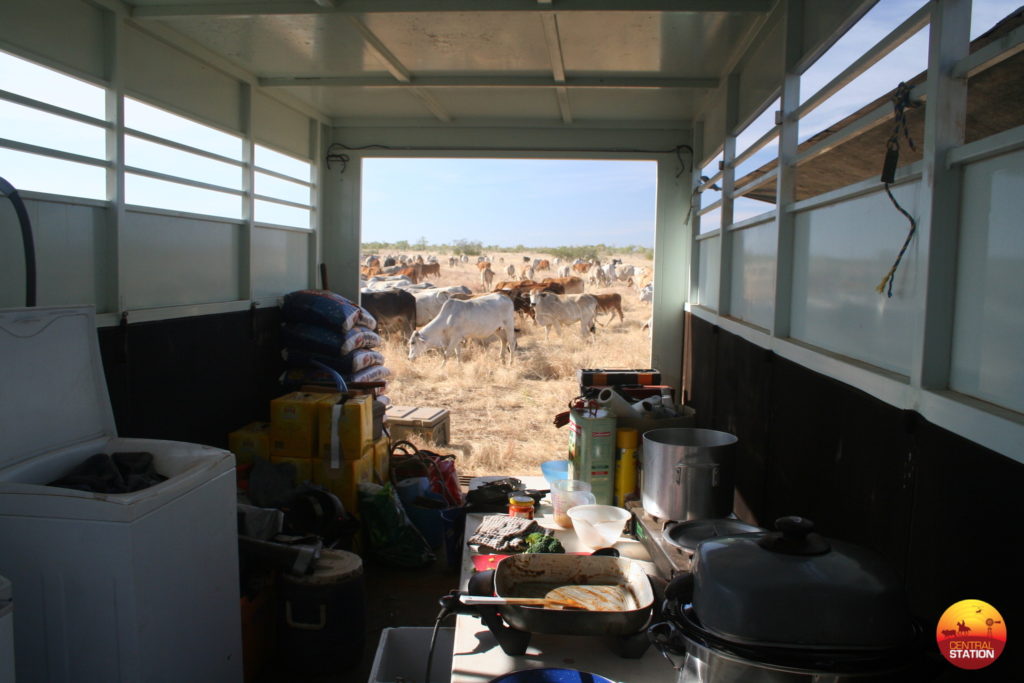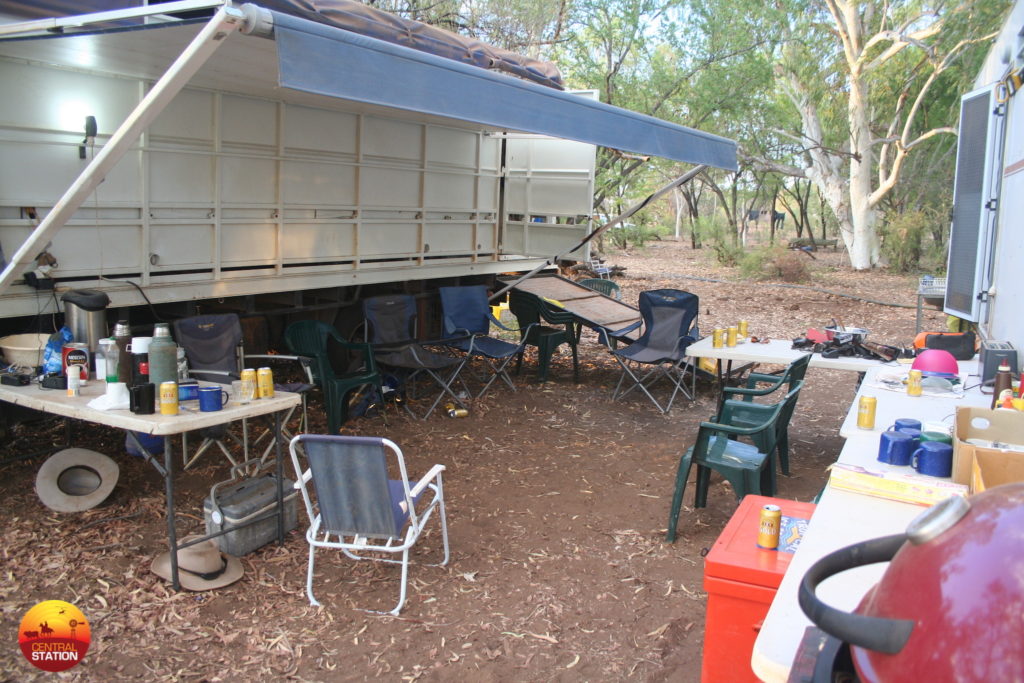Ten life lessons learnt from being a stockcamp cook
Host: Donal Sullivan
Cooking for a stockcamp for a season (between March and November) taught me a lot about myself, the people I worked with and life in general. I also learnt a bit about cooking, like how to salvage burnt scones, and how to cook good rib-bones! My kitchen was open to the elements, a gentle breeze would often extinguish my gas stoves and on more than one occasion the tarp which was my ‘roof’ was completely removed by the wind.
Here are ten life lessons I learnt while doing battle with my temperamental kitchen appliances, exposed to the elements.
 The view from the ‘indoor’ (in the back of a horse trailer) part of my camp kitchen.
The view from the ‘indoor’ (in the back of a horse trailer) part of my camp kitchen.
#1- Never trust the integrity of food packaging – This includes but is not limited to lemon essence, golden syrup (didn’t end well, very angry cook), coconut, curry paste, flour, rice, and milk (no use crying). When applying this to life, consider what lies before you. Is it four hundred metaphorical kilometres of rough travel? Prepare yourself for difficult times if you can see them coming and take the time to look after yourself so you can handle life’s corrugations. When applying this to packing food stores, a good rule of thumb is “If it would make you cry if it spilt everywhere, pack it properly!” I put parcel-tape around the lids, place the item in a freezer bag, then wrap it in newspaper. A bit over the top but hey! Cleaning golden syrup off everything isn’t fun.
#2 – If you’re worried about potato skins in the mashed potato then you’re probably on Masterchef and about to be eliminated – sorry. There are times in life when the small things really don’t matter. I always ask myself “Is it inedible? Will this make someone ill?” If both answers are no then I would serve it up and remind any complainants that I worked a full day with them before cooking dinner. If one answer is yes then we would have toasted sandwiches or Two Minute Noodles. Don’t sweat the small stuff as long as you’re getting things done.
#3 – Praying harder doesn’t make things defrost or cook any faster – I guess this life lesson comes back to preparation too, but it’s more about preparing your equipment/supplies. By organising yourself you can save so much stress in the long run. But I’m sure we’ve ALL had days where we feel like we’re constantly playing catch up. Have your back up meals planned for days when things just don’t work out. To make meat easier to defrost make sure it’s packed and frozen as flat as possible, especially mince and stew meat. The warm bonnet of a ute is an excellent place to sit a bag of defrosting meat, just ensure all blood is cleaned off before the boss sees and take the keys out of the ute so no-one drives off with it.
#4 – Six non-smoking Stockmen can eat two loaves of bread and drink 2L of milk per day if given the opportunity. No real life lesson here, just a fun fact. One thing you could probably take away from this is that even grown men are sometimes unable to restrain themselves when it comes to food! Sometimes it’s necessary to set the limits yourself, so that you know there will be enough for everyone.
#5 – There’s a reason recipes say “Grease Pan” at the start of the instructions, it’s so you don’t forget – This happened to me so many times! I’d ignore the advice given and realise later on it would have saved me a lot of trouble and a whole cinnamon date loaf. Often wisdom passed on has been hard won by someone else, and although you may be determined to make your own mistakes it is often easier to learn from someone else’s.
#6 – Always pack your own esky – As a cook I realised that I was the person who cared most about the food stores (food supplies). It made a big difference to me if butter was packed with dry stores, or lettuce was packed under ten kilograms of flour. At the end of the day I had to take responsibility for the resources I used and make sure they were looked after properly, no one else could do this for me. I often did the shopping by myself when we were in town. It would take me half a day and four or five trolleys full of groceries. I’d then have to pack the ‘cold stuff’ (all items needing refrigerating) into eskies and the rest into boxes and bags. Then we’d travel over five hundred kilometres to our next job, so how well something was packed could make a big difference! Sometimes I had to do a ‘food order’ while we were away, where I’d fill out a list of items and quantities required. The ‘stores’ would arrive from town the following week. Often it was missing items and sometimes poorly packed so items got crushed or spilt. One time a couple of boxes for our camp fell off the back of a ute and I had to pick the sand and grit out of blocks of cheese and frozen chickens.

#7 – Save your flattery for the staff – A life lesson which I learnt at boarding school where being thankful to the cooking staff gave me an edge over people who took them for granted. I often see people turn up to a station and make a big show of meeting ‘the boss man’, often casting off junior staff, domestic helpers and even the boss’s wife as unimportant. As a ‘Camp cook’, there were a number of times where visitors ignored me or didn’t bother to shake my hand. My advice to anyone arriving on a station is to greet and treat everyone equally. Take time to ask people how their day was, or how long they’ve worked there. If you can’t think of anything to say just smile and acknowledge them. Ask whoever is cooking if there’s anything you can help with, and mean it. Think about how good you feel when someone pays attention to you, and strive to make others feel the same. I have off days when I don’t really feel like interacting, or I am completely wiped out, and that happens to all of us. Being on good terms with the staff (especially the cook), will make life easier.
#8 – Washing up the dishes can be left until you feel emotionally ready to tackle it. When your work is physically and emotionally exhausting, it’s important to make sleep and rest a priority. With everything that happened day-to-day sometimes spending twenty minutes in the evening scrubbing a pot wasn’t an option for me. I’d fill the pot with water and stash it somewhere Meat Ants (a common type of ant in Northern Australia, which mostly eat meat but turns out they also eat almost anything they could get their tiny hands on in my kitchen) couldn’t find it. Usually I’d spend my smoko or lunch time catching up on washing up. I made sleep my biggest priority after cooking dinner because I knew that if I started getting too tired or run down I’d either get sick or breakdown emotionally. I was, and still am, very careful about making sleep and rest a priority when I have a large work load, because I know my physical limits.
#9 – When in doubt cooking dinner – more cheese, salt or BBQ sauce. When in doubt cooking dessert – more sugar, butter or chocolate. But only choose one to add more of! Not all three. And make sure that it is ‘just a little bit’, too much of anything is rarely a good thing, especially in cooking! When applying this to life – if there is no-one who can give you advice on how you’re going with your work it doesn’t hurt to put a bit extra into your work, whether it be extra time, extra effort, or extra resources. Just be careful that your ‘extra’ doesn’t get taken for granted. Realise that there’s only so much you can put into your work before you need some form of feedback.
#10 – Happy Cook, Happy Camp – You may hear this recited on stations across Australia. It’s a summary of how the feelings of the support staff can affect how the whole station operates, and the general mood. I learned the value of controlling my emotions, but also how bottling up feelings is not helpful either. I let my mood affect other people, and looking back now I would definitely do some things differently. However; there is no going back, only going forward with lessons learnt! Be mindful of how your actions and emotions affect those around you, and don’t be afraid to reach for help out if you need to.
A station or stock camp cook is an essential role on every cattle station, and sometimes the person who fills that role does other jobs as well, making the task even more challenging! I have a lot of respect for people who choose/are required to fill the role of station cook. A big thank-you to you all out there! May your food orders arrive un-squashed and your biscuits never burn.
